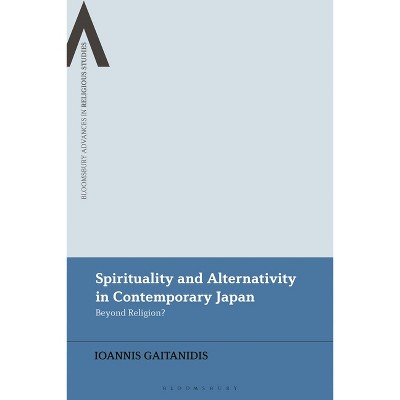Rethinking 'Classical Yoga' and Buddhism - (Bloomsbury Advances in Religious Studies) by Karen O'Brien-Kop (Paperback)

About this item
Highlights
- This book revisits the early systemic formation of meditation practices called 'yoga' in South Asia by employing metaphor theory.
- About the Author: Karen O'Brien-Kop is Lecturer in Asian Religions and Ethics at the University of Roehampton, UK.
- 280 Pages
- Religion + Beliefs, Hinduism
- Series Name: Bloomsbury Advances in Religious Studies
Description
About the Book
Challenges our understanding of 'classical' yoga and expands it beyond Patañjala yoga, showing how Hinduism and Buddhism co-constructed systems of yoga discipline using shared conceptual metaphors.Book Synopsis
This book revisits the early systemic formation of meditation practices called 'yoga' in South Asia by employing metaphor theory. Karen O'Brien-Kop also develops an alternative way of analysing the reception history of yoga that aims to decentre the Eurocentric and imperialist enterprises of the nineteenth-century to reframe the cultural period of the 1st - 5th centuries CE using categorical markers from South Asian intellectual history.
Buddhist traditions were just as concerned as Hindu traditions with meditative disciplines of yoga. By exploring the intertextuality of the Patanjalayogasastra with texts such as Vasubandhu's Abhidharmakosabhasya and Asanga's Yogacarabhumisastra, this book highlights and clarifies many ideologically Buddhist concepts and practices in Patanjala yoga. Karen O'Brien-Kop demonstrates that 'classical yoga' was co-constructed systemically by both Hindu and Buddhist thinkers who were drawing on the same conceptual metaphors of the period. This analysis demystifies early yoga-meditation as a timeless 'classical' practice and locates it in a specific material context of agrarian and urban economies.Review Quotes
"Rethinking 'Classical Yoga' and Buddhism offers a new and valuable discussion of the early history of yoga. It brings a careful assessment of metaphor theory into the discussion of early Indian soteriology, and explores the intertwined nature of Indian religious practices that we too easily divide off as "Hindu" and "Buddhist". A wonderful contribution to our understanding of Indian religion, literature and history." --Naomi Appleton, Director of Undergraduate Studies and Senior Lecturer in Asian Religions, University of Edinburgh, UK
"This book is ground-breaking, not only in its recognition and analysis of the Buddhist backdrop to Patanjali's Yoga tradition, but also in the application of cognitive metaphor theory to the study of Indian philosophical texts. In overcoming reified and anachronistic notions of "Hindu" and "Buddhist" in the study of contemplative traditions of ancient India, this work is to be highly recommended to anyone wishing to understand the broader intellectual and yogic context out of which Patanjali's Yoga Sutras emerged." --Richard King, Professor Emeritus of Buddhist and Asian Studies, University of Kent, UK "The author blends a keen historical sensitivity with intertextual analysis and the conceptual metaphor theory (CMT) of Lakoff and Johnson. ... The book makes important contributions to our understanding of the shared religiocultural environment that nourished the early discourse of yoga and the "conceptual sharing" between groups whose intellectual identity did not easily map onto any facile religious identity." --The Journal of Religion "This work contributes significantly to yoga and Buddhist studies, offering invaluable insights into the religio-cultural milieu of early Indian intellectual history. Its insights may also prove valuable for religious practitioners in general." --Religious Studies ReviewAbout the Author
Karen O'Brien-Kop is Lecturer in Asian Religions and Ethics at the University of Roehampton, UK.










